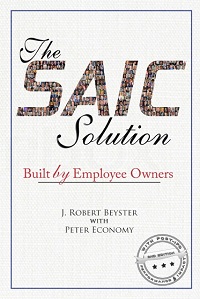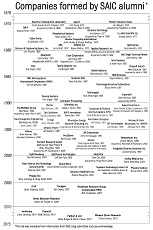Employee Ownership Award and Executive Pay
5 Comments Published by Dr. Beyster March 3rd, 2009 in Employee Ownership, Entrepreneurship.The FED recently announced a new program, the 2009 Shared Capitalism through Employee Ownership Award. The Award is being accomplished in partnership with the Center for Business Education at the Aspen Institute and the Employee Ownership Foundation.
The purpose of the award is to identify innovative research in business or business-related disciplines concerned with the impact or effectiveness of shared capitalism, broad-based ownership strategies, and participative workplace practices. This new program will I believe encourage quality academic research in employee ownership and help continue to spread the word.
If you know anyone who might be interested in applying for this program, I hope you will pass on this information.
* * *
I saw an interesting article in the Wall Street Journal by Judith Samuelson and Lynn Stout titled “Are Executives Paid Too Much?” The article puts forth the idea that our economy is in a mess not because of too-high executive salaries, but because executives were paid too much to do the wrong things.
I think the correct approach is not only salary, but bonuses that reward long-term performance of their businesses — by that I mean a year and beyond. The focus on short-term results is a mistake and it is not going to get our nation out of its current financial problems.
It is my impression that each day the economy is going deeper into a hole. Am I right or am I wrong? Do you think a depression is far behind?
Please take a look at my new post on Xconomy.com about the amount of stock entrepreneurs and company owners should try to retain to maintain control of their organizations. I would be interested in hearing what you think the answer is.
– Bob





Well Hello again Dr. Beyster,
This week I am finally starting the journey of sharing the control of Pyramid Space with a very talented team of fellow entrepreneurs. After studing the SAIC Solution and testing key aspects of the principles and comparing it to other sigularly owned successful business owners I know; your path has far more unimagined opportunities. The executive compenstation and “how much to hold on to” is a big issue. Ridiculous bonuses and salaries many times higher than necessary to live comfortably sap employee moral and raid company coffers. Often times the cash is from investors, banks, or in some instances, federal bailouts which is just wrong and is essentially theft. Now if the company is making high profits due to the direction from top management, then compensate them. If they are losing money, demote them and take away any bonuses and/or stock options. It they leave, so be it.
Now as to how much ownership… this is really tough.. As a 90% owner of Pyramid Space, I plan to now distribute stock initially down to a 51% holding. This is a giant leap of faith and departure for what I have pursued for the past 7 years. If this method proves successful, then it will be reduced to 30% by using stock to gather more top talent. The reduction from 30% down, starts to really reduce how much influence, real or perceived, an individual has over the company. Those decisions will have to be made with an awareness of the other significant holders of stock and the board members that control the company. Two percent??: not much you can do there.. .. Ten percent has a nice ring to it…
Depression is a state of mind and is contagious. I chose not to participate and all we need is a few hundred million souls to join me.
Cheers,
Eric Heininger
Eric: It looks to me that you have caught the employee ownership bug and are implementing it in a sensible manner. Each employee-owned company is different and how you implement your approach will reflect the needs and desires of key employees. You will need to face the compensation issues — both equity and salary — early. You need a set of rules that determines what fairness is in terms of compensation both at the executive and worker levels. At SAIC, this was approved by the board. Of course the equity compensation of the top people was also determined by the board. But the other compensation was determined by the operating management system. I agree with you on federal bailouts and I wish they were not happening. The fact that AIG had existing agreements that they could not break is a sad testimonial to the compensation package design for the company. It’s almost extortion. I hope that going forward management of these big companies being bailed out will change their compensation policies so as not to allow executive bonuses to be so excessive in this time of great economic strain. The problem to some extent — and it may be a good problem — is that some people will outperform their goals, and how to compensate them is a matter you need to be careful about. I would have to think some about that. It seems to me you’re doing the right thing on stock retention for yourself, which as you say has a nice ring to it. I wish you well with your enterprise and I hope you’ll check in from time to time to keep me up to date on your progress. — Bob
Dr. Beyster,
Thank you for your comments. The compensation for people that are outperfoming set goals really becomes a problem when you begin to give them stock and a sense of control of their destiny. They just don’t stop performing. It really is amazing to see the changes in attitudes and the breadth of ideas coming from individuals that just didn’t voice their opinions and ideas. Ownership, no matter how small, seems to make us all a little bit more equal.
Cheers,
Eric Heininger
Eric: Thanks for your note — your observations are the same as mine. — Bob
I think the problem is trying to pretend that the current reality fits some theoretical policy argument. I think many people believe rewarding CEO’s for good performance is a fine idea. They believed so decades ago, also. What we have now are executives looting companies like they are dictators, and cronies of the dictator, of failing states.
Executives deserve to be paid well. Executives do not deserve to pay themselves as though the company is their own kingdom. If we accept the ludicrous pay packages now as if they are related to paying for performance we have lost touch with reality.
Decades ago Peter Drucker argued executives deserved their rich pay. As the pay packages became obscene in the 1990′s he became a harsh critic of the abuses these unethical executives and their board cronies practiced. And since then the abuses of these parties has become immoral. The size of these abuses has moved from simple outmaneuvering the other parties to gain an unfair advantage for your personal gain versus the owners, workers, suppliers, communities… to plain immoral behavior. When we view these abuses are anything related to paying for services rendered we fail to see what is really going on.